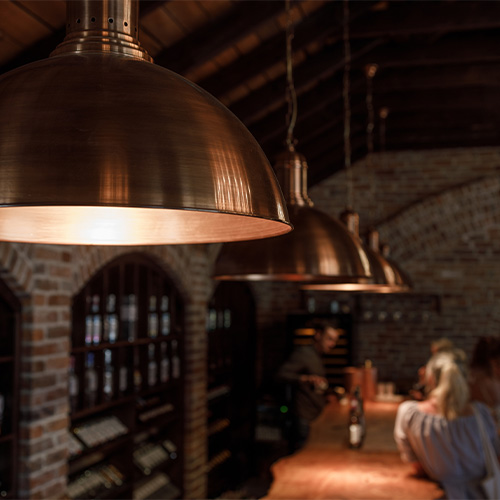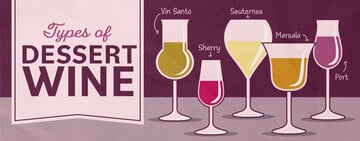
Starting a winery is an exciting venture for those passionate about wine and the winemaking process. However, before you dive into the complex world of winemaking and create your own business, it's essential to understand the key steps involved in starting a wine business. From planning your brand to obtaining the necessary licenses and equipment for wine services, we’ve created a comprehensive guide on how to start your own wine business.
Shop All Winery Supplies- Create a Wine Business Brand and Concept
- Write a Business Plan
- Secure Wine Business Funding
- Determine Wine Business Start-up Costs
- Apply for Wine Business Licenses and Permits
- Choose a Wine Business Location
- Buy Wine Business Equipment
- Create a Wine List and Menu
- Design a Wine Business Layout
- Hire and Train Wine Business Staff
- Market Your Wine Business
- Host a Wine Business Soft Opening
1. Create a Wine Business Brand and Concept

When establishing a wine business, one of the key elements to consider is crafting a strong brand and concept that resonates with your target audience. Your brand is more than just a logo or a name; it is the overall identity of your business that sets you apart from competitors and builds a loyal customer base.
Types of Wine Businesses
When considering starting a wine business, it's important to understand the various types of wine businesses in the industry. Each type has unique characteristics and requirements, catering to different aspects of the wine market. Here are some wine business concepts you can build your brand around:
- Winery - A winery is a facility where wine is produced from grapes or other fruits. Wineries vary in size, from small boutique wineries to large commercial operations. Starting a winery requires significant investment in equipment, vineyards, and production facilities.
- Wine Retail - Wine retail businesses sell wine directly to consumers through physical stores, online platforms, or a combination. Retailers may specialize in a specific type of wine, region, or price range to cater to their target market.
- Wine Bar or Restaurant - Wine bars and restaurants offer a curated selection of wines for customers to enjoy on-site. These businesses often focus on providing a unique dining experience paired with a selection of wines that complement their menu.
- Wine Importing and Distribution - Wine importing and distribution businesses focus on sourcing wines from different regions and selling them to retailers, restaurants, and consumers. This type of business involves building relationships with wineries and navigating the complex logistics of importing and distributing wine.
- Wine Tourism - Wine tourism businesses focus on providing wine-centric travel experiences, such as vineyard tours, tastings, and wine-themed events. These businesses often collaborate with local wineries to offer immersive experiences for wine enthusiasts.
2. Write a Business Plan
To start a successful wine business, one of the key steps is to develop a comprehensive wine business plan. A well-thought-out business plan serves as a roadmap for your venture, helping you define your goals, outline your strategies, and set a clear direction for your business.
- Executive Summary - The executive summary is a concise overview of your wine business plan. It should provide a snapshot of your business concept, goals, target market, competitive advantages, and financial projections.
- Company Overview and Description - In this section, provide detailed information about your wine business, including its history, mission statement, vision, core values, and unique selling proposition. Describe the products or services you offer, your target market, and the geographical area you plan to serve.
- Market Analysis - Conduct a thorough market analysis to identify the current trends in the wine industry, your target market demographics, consumer preferences, and potential competitors. Analyze the demand for different types of wines, pricing strategies, distribution channels, and market opportunities that can help you position your business effectively.
- Business Offerings - Detail the specific products or services your wine business will offer, including the types of wines, varietals, brands, and price points. Highlight unique features or services that set your offerings apart from competitors and attract customers.
- Management Plan and Ownership Structure - Outline the organizational structure of your wine business, including the roles and responsibilities of key team members, management team profiles, and the ownership structure. Clearly define decision-making processes, reporting relationships, and key personnel involved in the business operations.
- Marketing and Advertising Strategy - Develop a comprehensive marketing and advertising strategy to promote your wine business and attract customers. Identify your target audience, branding strategies, pricing tactics, distribution channels, promotional activities, and online marketing initiatives to increase brand visibility and drive sales.
- Financial Projections - Present detailed financial projections for your wine business, including revenue forecasts, sales projections, operating expenses, profit margins, cash flow statements, and break-even analysis. Provide a realistic assessment of your financial performance and growth potential to secure funding and make informed business decisions.
3. Secure Wine Business Funding

There are various options available to entrepreneurs looking to finance their venture. Understanding the different funding sources and selecting the most suitable one is crucial for the success of your winery. Below, we've listed some of the best ways to finance your wine business:
- Self-Funding - Self-funding is a common method through which the business owner invests their savings or assets into the business. While this can be a straightforward way to secure funding, it also comes with risks as all financial responsibility falls on the individual.
- Traditional Commercial Loans - Commercial loans are typically provided by banks or financial institutions and can offer a lump sum with a fixed repayment schedule and interest rate. These loans are great for large business investments in equipment, facilities, or vineyard expansion.
- Business Line of Credit - A business line of credit is a flexible funding option that allows wine business owners to access funds as needed up to a predetermined credit limit. This type of financing can be useful for covering operational expenses, purchasing inventory, or managing cash flow fluctuations.
- Small Business Loans - Small business loans are specifically designed for entrepreneurs looking to start or expand their businesses. These loans are offered by various lenders, including banks, credit unions, and online lenders. Small business loans can provide the capital for initial setup costs, marketing efforts, or hiring staff.
4. Determine Wine Business Start-up Costs
Starting a wine business requires careful financial planning to ensure a successful launch. Before diving into wine entrepreneurship, determine the full start-up costs involved. Understanding the financial requirements will help you create a realistic budget and secure the necessary funding.
- Licenses and Permits - Obtaining the appropriate licenses and permits is one of the initial costs you'll incur when starting a wine business. This includes federal permits from the Alcohol and Tobacco Tax and Trade Bureau (TTB), state licenses, and local permits. The costs associated with these licenses can vary depending on your location and the type of business you plan to operate.
- Equipment and Supplies - Investing in the right equipment and supplies is essential for producing and storing wine. This includes fermentation tanks, bottling equipment, barrels, wine refrigeration units, and other necessary tools for winemaking. The cost of equipment will depend on the scale of your operation and the quality of the products you intend to produce.
- Facility Costs - Securing a suitable location for your wine business is another significant expense. Whether you choose to lease or purchase a property, you'll need to factor in costs such as rent, utilities, insurance, and property maintenance. The size and condition of the facility will impact the overall cost of setting up your wine business.
- Raw Materials - Sourcing high-quality grapes or juice is crucial for producing exceptional wines. The cost of raw materials will depend on the variety and quality of grapes you choose, as well as the quantity needed for production. Additionally, you'll need to budget for packaging materials, such as bottles, labels, and closures.
- Marketing and Branding - Promoting your wine business and establishing a strong brand presence is essential for attracting customers. Budget for marketing expenses like website development, social media advertising, tasting events, and promotional materials. Developing a compelling brand identity will help differentiate your wines in a competitive market.
- Employee Costs - If you plan to hire staff to assist with winemaking, sales, or administrative tasks, you must allot funds for employee salaries and benefits. Consider the number of employees required to operate your business efficiently and factor in payroll expenses when calculating start-up costs.
5. Apply for Wine Business Licenses and Permits

Starting a wine business involves more than just having a passion for wine; it requires obtaining the necessary licenses and permits to operate legally. Here are some key wine licenses and permits to apply for when looking to start your own wine business:
- Federal Alcohol Permit - Before you can legally produce, distribute, or sell wine, you must obtain a federal alcohol permit from the Alcohol and Tobacco Tax and Trade Bureau (TTB). This permit is required for wineries, importers, and wholesalers.
- State Alcohol License - In addition to the federal permit, you will need a state alcohol license to operate your wine business. The specific requirements vary by state, so it is essential to research the regulations in your state and submit the necessary paperwork to the appropriate state agency.
- Sales Tax Permit - To sell wine directly to consumers, you need a sales tax permit from your state's Department of Revenue. This permit allows you to collect and remit sales tax on the wine you sell.
- Health Department Permit - If you plan to have a tasting room or restaurant on your winery premises, you will need a health department permit to ensure that you meet the food safety and sanitation requirements.
- Label Approval - The TTB requires that all wine labels comply with specific regulations regarding alcohol content, origin, and health warnings. Before selling your wine, you must submit your labels for approval to ensure compliance with federal regulations.
6. Choose a Wine Business Location
When starting a wine business, choosing the right location is vital for success. The location of your wine business can significantly impact your sales, foot traffic, and overall brand image. Choose an area that is easily accessible to your target market. A convenient and visible location can attract more customers and drive foot traffic to your wine business. Consider factors such as parking availability, public transportation access, and proximity to major roads or highways.
Take into consideration the types of wine businesses nearby, their offerings, and pricing strategies. Choosing a location with less direct competition or a unique selling proposition can help you stand out. You also need to evaluate the space and layout of the location to ensure it meets the operational needs of your wine business. Take into account factors such as storage capacity, tasting room size, production facilities, and potential for future expansion.
7. Buy Wine Business Equipment

Investing in the right equipment is important to ensure the quality and efficiency of your wine production process. By purchasing and maintaining the right winery equipment that aligns with your production needs and goals, you set a strong foundation for a successful wine business.
- Bottling Equipment - Bottling equipment, including fillers, corkers, and labeling machines, is essential for packaging the finished wine products. Investing in reliable bottling equipment ensures efficient and consistent bottling operations.
- Barrels and Oak Alternatives - Oak barrels are commonly used for aging wine as they impart unique flavors and aromas to the wine. However, oak alternatives such as oak chips, staves, and spirals are also available for businesses looking for cost-effective aging solutions.
- Presses - Wine presses are used to extract the juice from the crushed grapes. There are various types of presses available, including bladder presses, basket presses, and pneumatic presses, each offering different levels of efficiency and control over the extraction process.
- Crushers and Destemmers - These machines are used to crush and separate the grapes from the stems before fermentation. Crushers break the grape skins to release the juice, while destemmers remove the stems to prevent unwanted tannins and bitterness in the wine.
- Fermentation Tanks - Fermentation tanks are essential for the primary fermentation process where grape juice is transformed into wine. Stainless steel tanks are commonly used due to their durability, ease of cleaning, and non-reactive nature that preserves the quality of the wine.
- Wine Fridges - Investing in wine fridges is crucial to ensure that your wine collection remains in optimal condition. These units are available in various sizes and capacities to accommodate different storage needs. Confirm that your wine fridges are well-maintained, keeping your wine collection cool and ready to serve to guests.
8. Create a Wine List and Menu
Crafting a well-curated wine list is a must for any successful wine business. A thoughtfully designed wine list not only showcases your offerings but also enhances the overall dining experience for your customers. Include a diverse selection of wines that appeal to different preferences and budgets. Offer a mix of reds, whites, and roses from different regions and grape varietals to cater to a wide range of tastes.
It's important to offer wines at various price points to accommodate different budgets. Include affordable options for everyday enjoyment as well as premium wines for special occasions or connoisseurs. Other ways you can enhance the overall experience for customers include, providing detailed descriptions of each wine on your list, offering a selection of pairings like cheeses, and rotating your wine list seasonally to showcase new arrivals,
9. Design a Wine Business Layout

A vital aspect to consider when starting a wine business is the design of your layout. A well-thought-out layout enhances efficiency, productivity, and overall customer experience. Here are some key factors to keep in mind when designing your winery layout
- Flow - Design your layout to allow for a logical flow of operations. Design the layout in a way that minimizes unnecessary movement of materials and personnel, optimizing efficiency.
- Winery Equipment Placement - Place winemaking equipment strategically to facilitate the winemaking process. Consider factors such as workflow, accessibility, and safety when determining the placement of equipment.
- Tasting Room Design - The tasting room is often the face of your winery and plays a crucial role in attracting customers. Create an inviting and comfortable space that reflects your brand identity. Consider factors such as seating arrangements, lighting, and overall ambiance.
- Wine Storage - Proper wine storage is essential for maintaining the quality of your wines. Design a storage area that is climate-controlled, secure, and organized to ensure the longevity of your wine inventory.
- Accessibility - Ensure that your winery layout is accessible to employees, customers, and suppliers. Consider factors such as parking facilities, entrance points, and pathways to create a seamless experience for all stakeholders.
10. Hire and Train Wine Business Staff
When hiring staff for your wine business, look for individuals who have a passion for wine and possess a basic understanding of different varietals, regions, and production methods. While formal wine education or certification is not always necessary outside of hiring a sommelier, it can be beneficial to hire staff members who are willing to learn and expand their knowledge. Your staff should be friendly, approachable, and able to engage with customers in a professional manner. They should also be able to make recommendations based on customers' preferences and help them navigate your wine selection.
Develop a comprehensive training program for your staff that covers wine basics, customer service techniques, and any specific information about the wines you offer. Consider hosting regular tastings and educational sessions to keep your staff informed about new arrivals, special promotions, and industry trends. Your staff also needs to be trained in proper wine tasting techniques so they can accurately describe the flavors, aromas, and characteristics of the wines you carry. Encourage them to taste a variety of wines regularly to expand their palate and deepen their understanding of different styles.
11. Market Your Wine Business

Marketing plays a crucial role in the success of your winery business. Effectively promoting your products and brand can help you attract customers and increase sales and profits. Below we've outlined some effective goals and strategies to pursue to promote and advertise your wine business:
- Develop a Strong Brand Identity - Define your brand's unique selling points, such as the quality of your wines, your winemaking philosophy, or your vineyard's history. Use this identity consistently across all marketing materials, from labels and packaging to your website and social media profiles.
- Collaborate with Local Businesses - Building relationships with local restaurants, hotels, and retailers can help you expand your reach and attract new customers. Consider partnering with restaurants to feature your wines on their menus or hosting joint events.
- Utilize Digital Marketing - Create a professional website that showcases your wines, vineyard, and tasting room. Utilize social media platforms like Facebook, Instagram, and Twitter to engage with customers, share updates, and promote events, and consider investing in online advertising to target potential customers in your area.
- Host Tastings and Events - Hosting tastings and events at your winery is a great way to introduce customers to your wines and create a memorable experience. Offer guided tastings, vineyard tours, and special events like wine pairing dinners or live music nights.
- Develop a Wine Club or Subscription Service - Creating a wine club or subscription service can help you build a loyal customer base and generate recurring revenue. Offer exclusive discounts, early access to new releases, and special events for club members.
- Participate in Wine Competitions and Festivals - Entering your wines into competitions and participating in wine festivals can help increase brand recognition and credibility. Winning awards at prestigious competitions can attract media attention and build trust with customers.
12. Host a Wine Business Soft Opening
Before officially opening your wine business to the public, consider hosting a soft opening event to generate buzz and gather feedback. Invite friends, family, local influencers, and potential customers to sample your wines and provide valuable insights. Use this opportunity to showcase your space, share your story, and build relationships with your guests. Encourage them to provide feedback on the wines, ambiance, and overall experience to help you make necessary adjustments before your grand opening.
By understanding the key steps involved in launching a successful wine business, aspiring wine entrepreneurs can position themselves for success in a competitive industry. From conducting market research and securing the necessary permits to creating a unique brand and establishing distribution channels, each aspect of starting a wine business requires careful planning and execution. Utilizing these steps and leveraging industry insights, allows individuals to turn their passion for wine into a thriving business opportunity.





